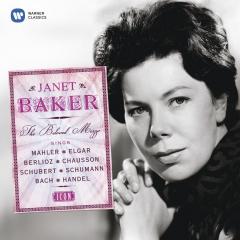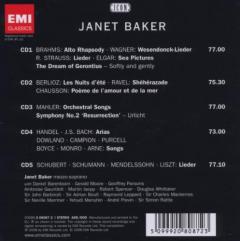Janet Baker and Christa Ludwig were probably the two greatest mezzo-sopranos of their generation and even though they are rather different in voice timbre and in approach to the music, close comparisons do not automatically lead to a clear preference for the work of the one over that of the other. Excellence in music can be spelled in more than one way. For me Janet Baker has the more personal and characteristic voice and many times I find her readings more ethereal. Her ability to invest that thin, spider-web pianissimo tone with emotion strikes a special string in my heart found by few other singers.
In Brahms's Alto Rhapsody we are reminded that Dame Janet in the beginning was classified as a contralto. She was also, as John Steane points out in his highly personal appreciation in the accompanying booklet, regarded as the natural successor to Kathleen Ferrier. She gradually moved up to a higher tessitura, lightened the tone but still retained the contralto depth, as we can hear on fairly late recordings as well. She developed a dramatic intensity and impressive volume that can be heard here, not least in the Wesendonck-Lieder, where her singing is truly heroic. The four Strauss songs are also superb. In all of these recordings Sir Adrian Boult has a firm grip on the proceedings and the LPO strings glow. Elgar's Sea Pictures became something of a Dame Janet signature work in the concert halls and it was this recording that brought the cycle back to the repertoire. I wrote enthusiastically about it a couple of years ago when it was reissued in the GROC series, coupled as originally with Jacqueline du Pré's reading of the Cello concerto (review) and I need not expend more space on it here. It is one of the really great recordings. The rapport between Janet Baker and Sir John Barbirolli is legendary and in this box we can marvel anew at their collaboration, which began with the recording of The Dream of Gerontius in 1964, from which Softly and gently is included here. This is marvellous singing - and playing.
On CD 2 we meet them in French repertoire. The Berlioz and Ravel cycles haven't been surpassed in the recording studio. Only Régine Crespin's Decca recording, also from the 1960s with Ernest Ansermet conducting, is on a par with Baker-Barbirolli. From a decade later comes Chausson's Poème de l'amour et de la mer - here André Previn is in his element, drawing lustrous playing from the LSO.
Janet Baker had a special affinity for Mahler and CD 3 is devoted entirely to his music. Ever since I heard Brigitte Fassbaender perform Kindertotenlieder live I have been completely hooked by her total identification. I rushed to get her Decca recording as soon as it came out. It is impossible to imagine a more involved, more nakedly personal reading, and this may also be its sole drawback: one tends to come so close to her, that she literally creeps under one's skin. I tend to be quite exhausted having listened to her. Janet Baker is just as involved but she keeps the distance and thus becomes `safer'.
The Five Rückert Songs have long been Desert Island Music for me and for my wife. When we sat down in the evenings after the turmoil of the working day some of them were invariably on the turntable - more often than not it was Ich bin der Welt abhanden gekommen, which here is placed last instead of third. Janet Baker's readings are for us the ultimate: concentrated, inward and with such power of expression. Baker and Barbirolli are markedly slower in Lieder eines fahrenden Gesellen than most other versions I have but there is no sense of dragging. The cycle is intended for a baritone and an old favourite of mine is Heinrich Schlusnus's recording from the early 1950s when he was well over 60. However several of the most successful versions are by women: Baker, Fassbaender and the Swedish mezzo-soprano Annika Skoglund in a live recording not generally available internationally.
The second Ich bin der Welt ... was recorded two years before the complete set as a filler for the other two cycles, and it is just as ethereal. The horn playing from the Hallé principal is possibly even more lyrical and the English horn is superb but here comparison are at the most exalted level. It is fascinating to play Urlicht from the Second Symphony immediately after Ich bin der Welt. Who could believe that the two recordings are separated by almost twenty years? That is a long time-span in any singer's career and if there is any deterioration at all in the voice it is so minimal that it is of no importance. This is as good a testimony as any to sound technique and intelligent choice of repertoire.
CD 4 takes us back to the baroque era, a field where Janet Baker reaped many laurels. This is not least through a number of superb recordings of Bach cantatas - and we get some tasty samplers of her greatness. In He was despised from Messiah we can admire her warm contralto tone and the nobility of her phrasing, while in the middle section of the aria there is true drama as well. Two excerpts from Italian cantatas by Handel display different sides of her art: the first a virtuoso display piece with sure-fire technique, lightness and agility; the second sad and plaintive. Some of the most delightful singing comes in the Elizabethan songs, sung with more face and more `alive' tone than most of the counter-tenors we normally hear in this repertoire. Purcell's Lord, what is man? is intense and as touching as her rendition of Dido's lament, which was recorded for another company. The songs by Boyce, Monro and Arne are little gems.
Finally we meet her as the Lieder recitalist, accompanied by Gerald Moore and Geoffrey Parsons in a number of Schubert's best known songs. In each case it is practically impossible to have any objections: an intense Gretchen am Spinnrade, Ave Maria the most inward and beautiful I can remember, a simple Heidenröslein¸ a vivid Die Forelle, a surprisingly fast Auf dem Wasser zu singen - otherwise she is often on the slow side. Possibly the most marvellous reading of all is Du bist die Ruh, sung pianissimo on a super-thin thread of tone.
In Frauenliebe und -Leben she has to stand comparison with Christa Ludwig and Brigitte Fassbaender. It is the latter she comes closest to. Like Fassbaender she sometimes sacrifices beauty of tone for expressive purposes. A curiosity is that the songs in this cycle were recorded seven years apart but the notes omit to tell us which songs were recorded when; it is impossible to find out through listening. Daniel Barenboim is a responsive accompanist. Finally she sings some lovely Mendelssohn, especially Nachtlied, and two of Franz Liszt's best songs. Every time I hear them I think it's a pity that they are so neglected. Lorelei is certainly a remarkable song, spanning so many emotions. Her favourite accompanist, Geoffrey Parsons, is on splendid form here.
This birthday present to Dame Janet Baker is brimful (more than six hours) of marvellous music in marvellous readings. The box sells at super budget price and not buying it is little short of criminal.
-- MusicWeb International
Icon: Dame Janet Baker
Categories:
Artist:
Record Label:
Publishing Date:
2008
Number of discs:
1
Support:
CD
Audio Format:
Stereo
Barcode:
5099920808723
Unavailable
Price applicable only to online purchases!
Free Gift Wrapping!
Free shipping over 150 RON
You can return it in 14 days
You got questions? Contact Us!


